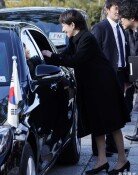Fallout from U.S.-China trade war hits South Korea
Fallout from U.S.-China trade war hits South Korea
Posted May. 24, 2019 08:10,
Updated May. 24, 2019 08:10
It has been confirmed the U.S. government has called on the South Korean government multiple times to stop using products made by China's telecom giant Huawei. This means that the fallout from the U.S.-China trade war over Huawei is also affecting South Korea. There are concerns that China’s retaliation against South Korea over the deployment of the United States’ THAAD anti-missile system two years ago will be repeated.
Huawei is at the forefront of China’s information and communication technology rise and ahead of the United States in the fifth-generation (5G) telecommunication technology together with South Korea’s tech giant Samsung Electronics.
Japan, Australia and New Zealand are actively involved in the U.S. campaign against Huawei. After some 30 U.S. suppliers to Huawei, including Qualcomm and Intel, declared a halt to trading with the Chinese company, British chipmaker ARM has also cut ties with Huawei. Japan’s Panasonic has also ceased trading with Huawei. Those companies probably found it difficult to resist U.S. pressure to choose side.
It is the harsh reality, however, that South Korea cannot afford to ignore China’s protest. Last year, South Korea’s exports to China totaled more than 162.2 billion U.S. dollars, accounting for 26.7 percent of the nation’s total overseas shipment. The interests of South Korean semiconductor and telecom equipment makers and part suppliers are intricately entangled. South Korean telecom operator LG Uplus has established its 5G networks with Huawei equipment. Some 100 other South Korean companies are trading with the Chinese tech giant.
The South Korean government is taking a reserved attitude toward the issue, saying that it cannot intervene private companies’ businesses. However, it is possible that the upcoming South Korea-U.S. summit will discuss the Huawei issue. The situation is too urgent for the government to stand by and watch without any strategy. It has to come up with a strategy by closely watching the situation involving the U.S.-China trade war and the domestic industries. In international relations, security and economy are working like an interlocked gear. Seoul has to throw away the unilinear perception of cooperating with the U.S. for security and with China for economy. In particular, the U.S. is approaching the ongoing trade negotiations with China not as just an economic issue but from the perspectives of a war over security and values. At such a juncture, Seoul should seek to further solidify its alliance with Washington and respond to the situation in strategic and agile manners. The deeper Washington’s understanding of Seoul’s economic and diplomatic situation is, the less frictions or pressures Seoul will have.







